|
|
|
Sort Order |
|
|
|
Items / Page
|
|
|
|
|
|
|
| Srl | Item |
| 1 |
ID:
098361
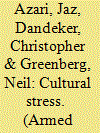

|
|
|
|
|
| Publication |
2010.
|
| Summary/Abstract |
The purpose of this article is to expand civil-military and military health research's concepts of stress with the addition of a theoretical construct of the concept known as "cultural stress." Military research often discusses combat and operational stress and its effect on soldiers but does not address unique culturally induced stressors created by the modern military's interaction with indigenous populations. Civilian research discusses stress as it relates to "culture shock" but does not account for unique pressures facing servicemen in both peacetime and wartime environments. This article synthesizes these concepts to produce a new conceptual basis of "cultural stress" from which further empirical research can be conducted.
|
|
|
|
|
|
|
|
|
|
|
|
|
|
|
|
| 2 |
ID:
094138
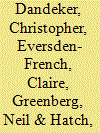

|
|
|
|
|
| Publication |
2010.
|
| Summary/Abstract |
U.K. Reserve Forces, principally the Territorial Army (TA), have been increasingly used since the end of the cold war, but there have been some concerns about their mental health problems and also possible unwillingness to remain in service. This article reports on the retention issues of 191 TA personnel who deployed to Iraq from 2003 to 2006. Qualitative data were thematically analyzed from three complementary studies. The authors found that, in 2003, negative aspects of Army organizational culture were reported as the prime reasons for TA personnel wishing to leave the military. In particular, Reservists reported their being unaccepted and underutilized. In contrast, by 2006, TA personnel were generally reporting being satisfied with their work as a Reservist and felt integrated with Regular colleagues. Those who stated they wanted to leave the military now reported it was primarily because of poor military family welfare support. These results suggest that although the British Army appears to have successfully managed the changing role and integration of the TA on operations, family welfare needs further consideration as an important influence on retention. Since the end of data collection for this study, new measures focusing on welfare have been introduced. Future work will assess the impact of these changes.
|
|
|
|
|
|
|
|
|
|
|
|
|
|
|
|
| 3 |
ID:
104759
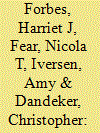

|
|
|
|
|
| Publication |
2011.
|
| Summary/Abstract |
The legacy of Gulf War Syndrome led to fears that the deployments to Iraq and Afghanistan since 2003 would have an effect on the mental health of the UK armed forces. Contrary to many people's expectations, deployment to Iraq and Afghanistan has not led to an increase in mental health problems and the overall number of personnel with symptoms of post-traumatic stress disorder is low. But there have been some costs: reservists and combat personnel are more at risk of mental health problems, and alcohol misuse continues to be rife amongst regulars.
|
|
|
|
|
|
|
|
|
|
|
|
|
|
|
|
| 4 |
ID:
047234


|
|
|
|
|
| Publication |
New Brunswick, Transaction Publishers, 1998.
|
| Description |
ix, 224p.
|
| Standard Number |
1560003391
|
|
|
|
|
|
|
|
|
|
|
|
Copies: C:1/I:0,R:0,Q:0
Circulation
| Accession# | Call# | Current Location | Status | Policy | Location |
| 044742 | 320.54/DAN 044742 | Main | On Shelf | General | |
|
|
|
|
| 5 |
ID:
120312
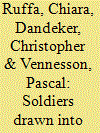

|
|
|
|
|
| Publication |
2013.
|
| Summary/Abstract |
The tactical level has become increasingly important in the conduct of contemporary complex military operations. Yet, the potential impact that this tactical level may have on domestic civil-military relations has been neglected. In this article, we focus on mechanisms by which low-level soldiers have acquired an increasing importance in tactical operations and we suggest that this may influence civil-military relations in the future. We argue that two phenomena deserve particular attention. These mechanisms are not new but they have had new effects by making it possible for soldiers to influence politics in sometimes unforeseen ways: the first is the strategic corporal and the second is the expansion of ancillary tasks. Our contribution lies at the interface between military sociology and security studies and seeks to show how the tactical level of warfare has become a fundamental context in which civil-military relations are enacted. Exploring these dynamics is fundamental to understanding under what conditions soldiers may interact with other actors in complex operations.
|
|
|
|
|
|
|
|
|
|
|
|
|
|
|
|
| 6 |
ID:
138760


|
|
|
|
|
| Summary/Abstract |
This article analyzes public opinion of the armed forces, focusing on Sweden and the
United Kingdom. The cases offer interesting similarities, such as their institutions of parliamentary monarchies and, most recently, their reliance on all-volunteer force, as well as differences especially with regard to their experience of international defence missions. The discussion considers the extent to which the public has been supportive of recent missions conducted by Swedish and UK armed forces, and whether such support is also accompanied by support for the armed forces as an institution. Levels of opinion and trust in the military are quite different in both cases, and public opinion of international missions reflects the contrasting historical engagements of both states. In both cases, we also find a divergence between what
publics are willing to support and what national governments wish to pursue as missions
for their armed forces.
|
|
|
|
|
|
|
|
|
|
|
|
|
|
|
|
| 7 |
ID:
104085
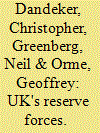

|
|
|
|
|
| Publication |
2011.
|
| Summary/Abstract |
This article focuses on how the role and structure of the UK's Reserve Forces have changed since their foundation before the First World War, with particular attention paid to the last two decades, during which time government has sought to make the Reserves more useable and relevant to post-Cold War military missions, including changing the legislative and administrative basis of their use. Since 9/11, Reserves have played an important role in the defense of the United Kingdom, particularly in operations in Afghanistan and Iraq, but the recent financial crisis has spurred further consideration of how best to structure and use this capability, which has been included as part of the recent Strategic Defence and Security Review (SDSR). The article analyses the current debate on whether the number of Reserve Forces should be cut or increased, and on how best to integrate their efforts with those of the Regular Forces. It also considers the evidence on the recent operational experience of Reserve Forces and its impact on a number of personnel issues, including recruitment, retention, and their health and well-being. The differences between the health and well-being outcomes for Reserve and Regular Forces are discussed and future lines of research enquiry highlighted, while the implications for the comparative analysis of Reserve Forces are also drawn out.
|
|
|
|
|
|
|
|
|
|
|
|
|
|
|
|
|
|
|
|
|